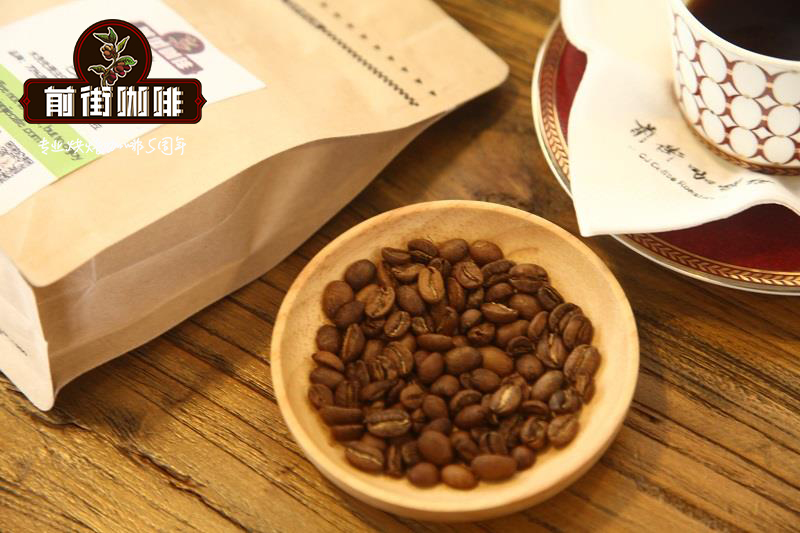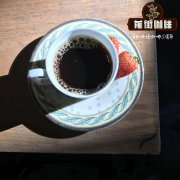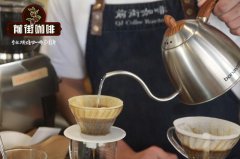Introduction to the types of coffee: blue Mountain, Java, Manteau, Mocha, Brazilian Coffee varieties and characteristics

Professional coffee knowledge exchange more coffee bean information please follow the coffee workshop (Wechat official account cafe_style)
There are four kinds of coffee trees in the world.
There are only two kinds of plants that are of real commercial value and are planted in large quantities. One is the Elaraby species (ARABICA), and the other is the Robasta species (KOBUSTA). Different varieties of coffee beans have different tastes, but even the same varieties of coffee trees have their own unique flavor due to the influence of different soils and different climates.
Elaraby coffee trees are more difficult to grow. They like mild days and cooler nights. Too cold, too hot, and too humid climates can be fatal. Elaraby needs to plant coffee trees on sloping slopes at high elevations, so harvesting must be carried out manually, which is extremely difficult. However, due to the excellent aroma, balanced taste and low caffeine content of Elaraby coffee beans, although it is not easy to grow, it actually accounts for about 70% of the total coffee planting.
Robasta grows coffee trees that are resistant to high temperature, cold, moisture, drought and even mold. Its adaptability is extremely strong, it can grow very well on flat land, and harvesting does not necessarily need manual work, but can be carried out completely by vibrating machines. As far as planting is concerned, Robasta has many advantages in growing coffee trees, but it is a pity that the coffee beans produced are bad in aroma, bitter in taste, insufficient in acidity, and double the caffeine content of Elaraby. Robasta has more personality in the mouth of caffeine beans, which is mostly used for blending or instant coffee.
These two kinds of coffee beans are divided by origin, Elaraby is mainly found in Brazil, Colombia, Central American countries in South America, Costa Rica, Guatemala, Jamaica and Mexico in the Caribbean, as well as Ethiopia, Kenya, Tanzania and other countries. The granules of Arabica coffee beans are large, uniform in size and glossy in color.
Robastian coffee beans are mostly small, with different shapes and sizes, and are not very good-looking. They are mainly produced in Uganda, C ô te d'Ivoire, Congo, Zaire, Angola and other countries. Generally speaking, the coffee beans that everyone is most familiar with when drinking individual coffee in Taiwan cafes, such as the mountains of Brazil, Mantenin of Colombia, Mocha of Yemen, and Blue Mountains of Jamaica, are all high-quality coffee beans grown by Elaraby.
Types of coffee beans
Blue Mountain
The best beans produced on the slopes of the Blue Mountains in Jamaica have a limited output of delicious food in the world, and they are the best in coffee, but they are mostly monopolized by coffee buyers from Japan, the United States and Britain, so most of the blue mountains on the market are not pure. Recently, the stationmaster saw the Blue Mountain imported from Japan in a department store in Nanjing, Taipei, and the price was NT $1700 / lb. of course, there was a price of about NT $420 / lb in the store, with a price difference of about 4 times. Therefore, the purity of Blue Mountain on the market needs to be evaluated by netizens themselves.
Claw wow
Beans from Indonesia, Java has become a coffee center, bitter and mellow, Indonesian beans with rustic flavor, with wild, mellow Yemeni mocha beans is a good combination.
Manning
The same as Java, it is produced in Indonesia, but Mantenin is of stable quality, rich texture, good consistency and low sour taste. It has been the main pillar of comprehensive coffee for many years. Because of the sweet and bitter taste, strong taste and low sour taste, Manning has been the favorite of the stationmaster in recent years, and it is more suitable for drinkers who do not like sour taste.
Mocha
Mocha originally refers to the beans transported by the Arabian port of Mocha, located in the countries of Yemen on the Arabian Peninsula. Today's pure and rare Yemeni mocha is rare. The pure mocha is rare and expensive, rich and mellow in flavor, and strong in sour taste.
Baxi
Brazilian beans have their own special flavor, but they are not liked by buyers and are often used as a substitute when coffee beans are produced less.
A major producer of coffee
Kenya (Kenya- Africa)
Located in Kenya near East Africa, the coffee beans planted are high-quality Arabica varieties. The size of beans is medium-large, very thick and delicious, and moderate acidity. The grade is divided into seven grades according to the size of the coffee beans and six grades according to the taste. "Kenya AA" is particularly well received in terms of taste.
Ethiopia (Ethiopia- Africa)
The origin of the name of coffee comes from the Canadian place in the southwest and the Sidamo place in the south are the main producing areas. In addition, the Eastern Highland Hara is also famous for its coffee. The beans are small and fragrant, and Hara. Mocha "Longgubeli" and other special names, have a unique flavor, usually only known as mocha.
Yemen (Yemen- Africa)
Yemen, commonly known as Arabia, the birthplace of the Arabica species, was once popular in the name of "mocha coffee", but now it is no longer a grand occasion. But its wine-like flavor, rich and mellow characteristics, is still quite popular with consumers after-dinner coffee. Like Brazil, the coffee produced in Columbia is the same as the three swordsmen who are chosen as blended coffee. The "Matari" produced in Bani Matar and the "Sanani" produced in Sanaya are also quite famous.
Indonesia (Indonesia- Southeast Asia)
The main producing areas are Sumatra, Java and Sulawesi. 90% of them are Robbas species, which can be rated as the best in the world. Sumatra is best known for its rich, catchy and upscale Mantenin. In addition, "Jiayu Mountain" is also produced in the north of the island, while Elaraby card in Java has a good sour taste, especially loved by the Dutch. What Sulawesi Island produces is a large grain of "Kalosi", represented by "Traga" from Traga in the hills of the southwest.
Main producing areas and characteristics of coffee beans
No.
Place of Origin
Product Name
Description
Incense
Gan
Sour
Alcohol
Bitter
Remarks
one
Jamaica
Jmaica
The best blue mountains
Blue Mountain
It is famous in the Blue Mountain, which is 2256 meters above sea level. It is planted on slopes of 80-1500 meters. It is divided into No1, No2 and No3.
Strong
Strong
Weak
Strong
Soft
The highest grade product
two
Brazil
Brazil
Santos
Santos
It is of good quality and is considered to be an indispensable bean in mixing. The quality types of No1. And No2,Screen18-19 are the most well-received and widely used.
Medium
Strong
Medium
Medium
Weak
Suitable for allocation
three
Colombia
Colombia
Colombia
Colombia
The second largest producer in the world. Coffee beans are light green, large granules, with heavy flavor, whether single drink or mixed are very suitable.
Strong
Medium
Medium
Strong
Weak
The most standard quality
four
Ethiopia
Ethiopia
Mocha
Mocha
For the origin of coffee, small particles, dry type, showing turquoise, with special aroma and sour taste. Ethiopia grades No1.-No8 according to the blending rate of defective beans.
Strong
Medium
Medium
Strong
Soft
Special flavor
five
Indonesia
Indonesia
Java
Java
The small amount of Arabian native beans produced on the island of Java, with small grains, is a kind of sour and good bean. It was once the best variety in the world, but it was changed to the resistant Robasta species due to large-scale diseases and insect pests in 1920. The personalized Java Robasta is widely used for mixing.
Weak
Medium
Weak
Medium
Strong
Suitable for allocation
six
Sumatra
Sumatra
Manning
Mandheling
Mantenin produced on the island of Sumatra is one of the few Arabica species with large particles, but poor production management and good baking will reflect the beans and were once regarded as grade before the mountain appeared.
Strong
Medium
Weak
Medium
Strong
Unique flavor
Important Notice :
前街咖啡 FrontStreet Coffee has moved to new addredd:
FrontStreet Coffee Address: 315,Donghua East Road,GuangZhou
Tel:020 38364473
- Prev

100% Arabica coffee beans = good coffee? The types, advantages and disadvantages of coffee beans
Professional coffee knowledge exchange more coffee bean information please follow the coffee workshop (Wechat official account cafe_style) coffee beans: there are more than 100 kinds of coffee in the world, but at present there are two most common coffee beans: Arabica and Robusta these two kinds of coffee are different in flavor, caffeine proportion and planting conditions.
- Next

Coffee shop menu illustration of coffee types no longer have to worry about not understanding the menu!
Professional coffee knowledge exchange more coffee bean information Please follow the coffee workshop (Wechat official account cafe_style) every time I meet someone in a coffee shop, do you not understand the menu and do not know which one to order coffee? The following picture explains the difference between 12 kinds of coffee, which is shared with you: many people like to drink coffee, but their concept of coffee is not necessarily correct.
Related
- Detailed explanation of Jadeite planting Land in Panamanian Jadeite Manor introduction to the grading system of Jadeite competitive bidding, Red bid, Green bid and Rose Summer
- Story of Coffee planting in Brenka region of Costa Rica Stonehenge Manor anaerobic heavy honey treatment of flavor mouth
- What's on the barrel of Blue Mountain Coffee beans?
- Can American coffee also pull flowers? How to use hot American style to pull out a good-looking pattern?
- Can you make a cold extract with coffee beans? What is the right proportion for cold-extracted coffee formula?
- Indonesian PWN Gold Mandrine Coffee Origin Features Flavor How to Chong? Mandolin coffee is American.
- A brief introduction to the flavor characteristics of Brazilian yellow bourbon coffee beans
- What is the effect of different water quality on the flavor of cold-extracted coffee? What kind of water is best for brewing coffee?
- Why do you think of Rose Summer whenever you mention Panamanian coffee?
- Introduction to the characteristics of authentic blue mountain coffee bean producing areas? What is the CIB Coffee Authority in Jamaica?

